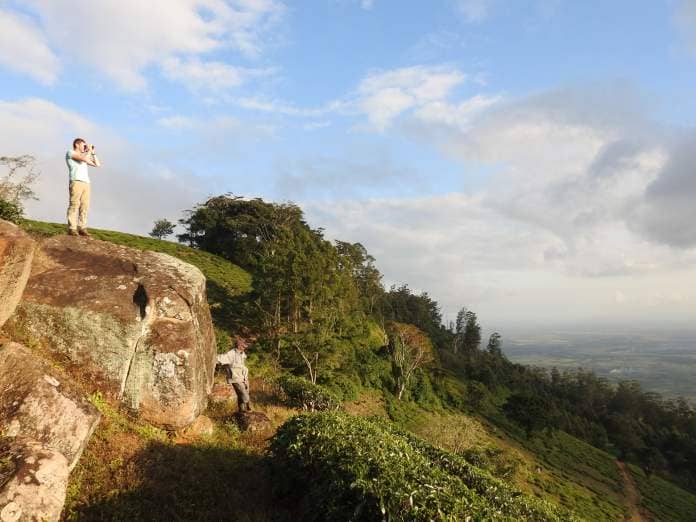Key takeaways
- Much scientific research has examined the effects of one environmental factor or another on wildlife and habitats. But few studies have examined the effects of multiple factors at the same time in the same location.
- A new UCLA-led study analyzes how warming temperatures and fragmenting habitats are affecting 24 species of tropical birds in the Usambara Mountains of East Africa, one of the most species-rich regions on the planet.
- Warming temperatures were the bigger threat, negatively affecting 14 of the 24 species during the 34 years studied.
In recent decades, scientists have produced countless studies on the effects of one environmental factor or another — climate change, deforestation or pollution, for example — on wildlife and habitats around the world. But few have examined the interplay and overlap among multiple factors at the same time in the same location.
But understanding how such threats work together, and whether certain factors intensify or mitigate others, will be crucial for protecting plant and animal species in a rapidly changing world.
A new UCLA-led study takes that approach, analyzing how warming temperatures and fragmenting habitats — areas of wilderness that have been separated by agriculture and other human development — are affecting 24 species of tropical birds in the Usambara Mountains of East Africa, one of the most species-rich regions on the planet.
Over the course of the 34 years the researchers analyzed, from 1987 to 2020, nine of the 24 species were affected by both factors. But warming temperatures were the bigger threat, negatively affecting 14 of the species. In the hottest year during the study, population growth rates declined 20%, even in the largest habitat fragment, which was 5.84 square miles.
One reason that fragmentation didn’t account for more damage was that most of the area’s habitat loss took place decades before the period analyzed in the study, said UCLA ecologist Monte Neate-Clegg, the paper’s lead author.
The researchers were particularly interested in learning whether the temperature changes and habitat fragmentation had synergistic effects — meaning that each factor made the other worse. Although they found a few such examples, the overall picture was complex.
“It wasn’t what we expected,” Neate-Clegg said. “Some species even seemed to be doing better in small fragments than in larger ones. We’re not sure exactly what’s going on, but higher temperatures may be increasing the production of fruit or some other resource.”
Overall, however, the future of birds in the Usambara Mountains looks difficult, Neate-Clegg said. As temperatures rise and threaten local populations, suitable new habitat is scarce or difficult for them to reach. Unlike other birds, tropical birds in the region are often unable to fly long distances. Some even avoid crossing small gaps such as roads.

Courtesy of Monte Neate-Clegg
UCLA ecologist Monte Neate-Clegg (left) and a colleague conducting research in Tanzania.
“Over time, this trend is likely to push these species to consistent declines,” Neate-Clegg said.
The researchers studied species including flycatchers, spot-throats and several sunbirds, which look and fly a lot like hummingbirds. All of the species they studied play critical roles in a wildlife hotspot, pollinating and dispersing seeds of plants that serve as habitat for a wide range of animals, including black and white colobus monkeys, chameleons and elephant shrews. Because they eat insects that spread diseases and maintain forests that help regulate water supply, the birds also help humans.
Aside from such practical value, tropical birds contribute to natural beauty that, by attracting tourists, can help sustain livelihoods and communities.
“There’s a lot to be said for ecotourism when it’s done right,” Neate-Clegg said. “If the forest were healthier and there was more wildlife, more people would come and bring more money into the area.”
Wildlife protection efforts have helped bring billions of dollars to places like Costa Rica and the Serengeti. According to a 2021 World Bank report, investments in protected areas generate six times their value in economic return.
Conservation is key to making such investments work, but it must be done strategically.
“Poorly considered conservation can be like whack-a-mole — if you only address one problem, another one pops up,” said UCLA ecologist Morgan Tingley, a co-author of the paper. “Conserving the world’s biodiversity requires addressing multiple, simultaneous threats. We can’t focus only on habitat preservation or climate change mitigation. We need to consider the entire picture.”


